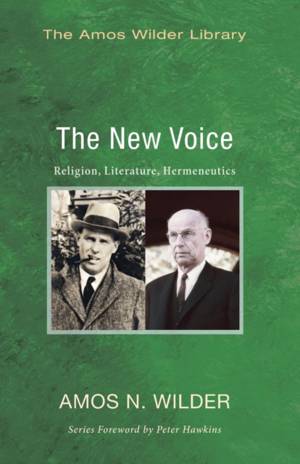
- Retrait gratuit dans votre magasin Club
- 7.000.000 titres dans notre catalogue
- Payer en toute sécurité
- Toujours un magasin près de chez vous
- Retrait gratuit dans votre magasin Club
- 7.000.0000 titres dans notre catalogue
- Payer en toute sécurité
- Toujours un magasin près de chez vous
Description
Description: In The New Voice, Amos Wilder carries forward and combines two areas of activity represented in his earlier, groundbreaking publications. One of these is that of the theological critic, concerned with modern literature as it illuminates the quests of our age and the vicissitudes of our religious tradition, as found in his Modern Poetry and the Christian Tradition and Theology and Modern Literature. The other area is that of biblical scholarship, especially in its recent concern with hermeneutics and the modes of language, as represented by his volume on early Christian rhetoric, The Language of the Gospel. Wilder seeks in the present book to deepen and correct the approach of the theological critic by urging that rhetorical criteria should receive primary attention and that language should be explored in new ways. Wilder therefore examines certain aspects of biblical genre and style as ways of illuminating modern rhetoric and its underlying assumptions. It is a main theme of the work that the disorders and travail of our time should be construed in a positive light, and that the most significant writing of the period not only illuminates contemporary reality but fashions a language in which the abiding legacies and archetypes of the past can again be brought to speech. Writers specially discussed in the book range from Musil, Proust, Eliot, and Gide to Sartre, Perse, Beckett, Lowell, David Jones, and the exponents of open verse. The work of many others is brought into relation with the task defined by Pound as naming things accurately and by Stevens as ""making the bread of faithful speech.""
Spécifications
Parties prenantes
- Auteur(s) :
- Editeur:
Contenu
- Nombre de pages :
- 270
- Langue:
- Anglais
- Collection :
Caractéristiques
- EAN:
- 9781625645043
- Date de parution :
- 01-12-13
- Format:
- Livre broché
- Format numérique:
- Trade paperback (VS)
- Dimensions :
- 137 mm x 213 mm
- Poids :
- 317 g

Les avis
Nous publions uniquement les avis qui respectent les conditions requises. Consultez nos conditions pour les avis.






